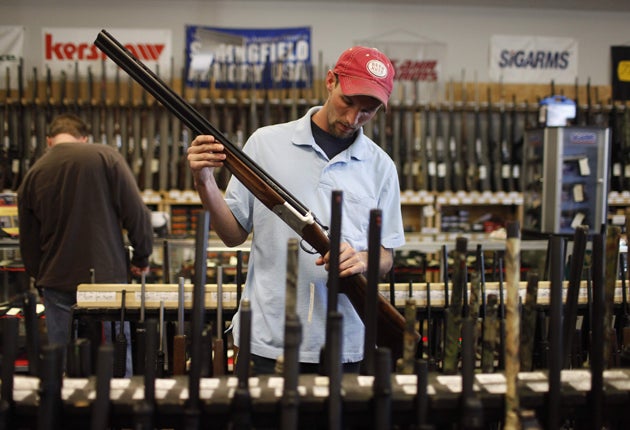Why it's getting easier to carry a gun in the US
In the past two years, firearm restrictions have been relaxed in 24 states

In many states across the US, it's getting easier to carry a gun – and many say it's the result of a campaign by the National Rifle Association (NRA). A nationwide review by Associated Press found that, over the past two years, 24 states, mostly in the south and west, have passed 47 new laws that relax gun restrictions.
Among other things, legislatures have allowed firearms to be carried in cars, made it illegal to ask job candidates whether they own a gun, and expanded agreements that make permits to carry handguns in one state valid in another.
The NRA, the leading gun- owners lobby in the US, has blocked attempts by Washington to tighten firearms laws for years, but has been increasing its efforts at the state level to chip away at gun restrictions.
"This is all a co-ordinated approach to respect that human, God-given right of self-defence by law-abiding Americans," says Chris W Cox, the NRA's chief lobbyist. "We'll rest when all 50 states allow and respect the right of law-abiding people to defend themselves from criminal attack."
Tennessee and Montana, for example, have passed laws that exempt weapons made and owned in-state from federal restrictions. Tennessee is the home of Barrett Firearms Manufacturing, the maker of a .50-calibre shoulder-fired rifle which the company says can shoot bullets up to five miles (eight kilometres). The rifle is banned in California.
There have been gun-friendly law changes in other states. Arizona, Florida, Louisiana and Utah have made it illegal for businesses to bar their employees from storing guns in cars parked on company lots. Some states have made handgun permit information confidential, and others have allowed handgun permits to be issued to people who have had their criminal convictions expunged or their full civil rights restored.
Associated Press compiled the data on new laws from a range of groups, including the Legal Community Against Violence, which advocates gun control, and the NRA. Public attitudes toward gun control have shifted strongly over the past 50 years, according to Gallup polling. In 1959, 60 per cent of respondents said they favoured a ban on handguns except for "police and other authorised persons". Gallup's most recent annual crime survey in October found 71 per cent opposed such a ban.
The NRA boasts that almost all states grant handgun permits to people with clean criminal and psychological records. In 1987, just 10 states did. Only Wisconsin, Illinois and Washington DC now prohibit carrying concealed handguns entirely. "The NRA has a stranglehold on a lot of state legislatures," said Kristin Rand, legislative director of the Violence Policy Centre, a gun-control group in Washington. "Basically, they have convinced lawmakers they can cost them their seats, even though there's no real evidence to back that up."
Tennessee's new laws came after the Republican takeover of the General Assembly this year, but most other states that loosened restrictions didn't experience major partisan shifts. Most of the states where the new laws were enacted have large rural populations, where support for gun rights tends to cross party lines.
While some states have tightened gun laws during the same period, the list of new restrictive laws is much shorter. In 2009 alone, more than three times as many laws were passed to make it easier on gun owners. New Jersey's 2009 law limiting people to one handgun purchase per month is the most notable of the more restrictive laws. Other examples this year include Maryland's ban on concealed weapons on public transport and Maine's vote to give public universities and colleges the power to regulate firearms on campus.
The most contentious of Tennessee's new gun laws was one allowing handguns in bars and restaurants that serve alcohol. It took effect in July after lawmakers overrode a veto by the governor. Last month, a Nashville judge struck down the law as unconstitutionally vague, but supporters have vowed to pass it again. A similar Arizona law which took effect in September allows people with concealed-weapons permits to bring their guns into bars and restaurants that haven't posted signs banning the practice.
While Tennessee's law was in place, many bars chose not to let customers bring guns in. Likewise, more than 70 communities have opted out of allowing guns in parks. "People go in there and start drinking, and then they want to start a fight. What are they going to do if they got a gun in their hand?" said Larry Speck, 69, who works at an auto repair shop in Memphis. "I've got a gun permit and I'm not carrying mine in there, even if they have a law."
Academics are divided on the effects of liberalised handgun laws, and determining the impact is complicated by the move in several states to close handgun permit records.
A Violence Policy Centre project that surveyed news reports found that more than 100 people have been killed by holders of handgun-carry permits since 2007, including nine law enforcement officers.
The project originally intended to list all gun crimes by permit holders, but there were too many to keep track of, said Kristin Rand. "They shoot each other over parking spaces, at football games and at family events," Ms Rand said. "The idea that you're making any place safer by injecting more guns is just completely contradicted by the facts."
Subscribe to Independent Premium to bookmark this article
Want to bookmark your favourite articles and stories to read or reference later? Start your Independent Premium subscription today.

Join our commenting forum
Join thought-provoking conversations, follow other Independent readers and see their replies